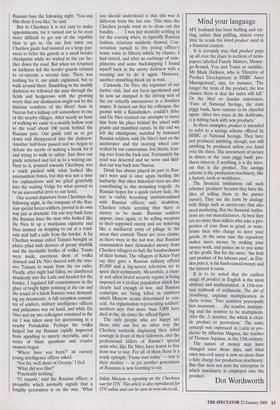Mind your language
MY husband has been huffing and tut- ting, rather than puffing, almost every time he reads the word product used in a financial context.
It is certainly true that product pops up all over the place in sections of news- papers labelled Family Matters, Money- go-Round, You and Yours or suchlike. Mr Mark Dickson, who is 'Director of Product Development at HSBC Asset Management', says, for instance, 'The longer the term of the product, the less chance there is that the index will fall.' Or the Mail on Sunday announces, `Fans of National Savings, the state piggy bank, have reasons to be cheerful again. After two years in the doldrums, it is hitting back with new products.'
In these examples, product is intended to refer to a savings scheme offered by HSBC or National Savings. They have not produced anything, though, nor will anything be produced unless you hand over the rhino. The investment of money in shares or the 'state piggy bank' pro- duces interest; if anything, it is the inter- est that is the product. The savings scheme is the production machinery, like a factory, tools or workforce.
The financial institutions call such schemes 'products' because they have the idea of selling them to the punter (saver). They use the term by analogy with things such as motor-cars that also need marketing. But the financial institu- tions are not manufacturers. At best they are no more than millers who take a pro- portion of your flour to grind, or ware- house men who charge to store your goods. At the same time the repository makes more money by making your money work, and passes on to you some of the profit. But for the saver, 'the fruit and product of his labours past', as Dry- den puts it, is his hard-earned money and the interest it earns.
It is to be noted that the earliest usage of product in English is the most abstract and mathematical. A 15th-cen- tury textbook of arithmetic, The Art of Nombryng, explains multiplication in these terms: 'Two nombres pryncipally ben necessary . . the nombre multiply- ing and the nombre to be multipliede. Also the .3. nombre, the which is clepi- de product or pervenient.' The same concept was expressed in Latin as pro- ductus by Albertus Magnus, the teacher of Thomas Aquinas, in the 13th century.
The nature of money may have changed since those days, and what once was evil usury is now no more than a hire charge for production machinery. But that does not turn the enterprise in which machinery is employed into the product.
Dot Wordsworth


























































 Previous page
Previous page